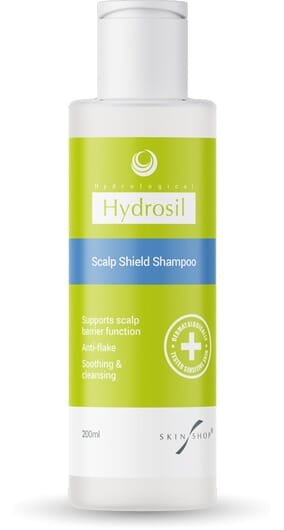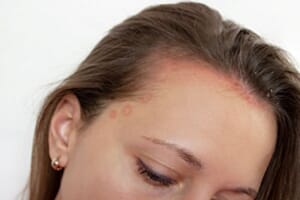Wigs are worn by thousands of people, but the texture, glue or tape and lack of ventilation from wigs often leads to a dry itchy scalp for regular wig wearers.
Wigs are worn for many reasons that are not related to hair loss, but also to confidence after hair loss conditions such as alopecia and other hair thinning conditions as well as hair loss related to chemotherapy treatment. The side effects of chemotherapy can also cause dry skin as well as hair loss, makig itchy dry scalp even more common in wig wearing patients recovering from chemotherapy treatment.
No matter what the reason for wearing a wig is, regular wig wearers often experience an intolerable dry itchy scalp caused by the fabric of the wig itself, bacterial build from sweating under the wig or skin reactions to the glue or tape used to keep wigs in place.
How to protect your scalp and combat dry itchy scalp when wearing wigs
Here is our guide on how to help reduce scalp itching and irritation from wigs:
1. Human hair vs synthetic hair
A good quality wig is essential to reduce a dry itchy scalp. Although it is widely assumed that good quality wigs are made from human hair, this is not necessarily the case. Good quality, well made synthetic wigs can actually cause less irritation than wigs made from human hair. They also wash more easily than human hair wigs and have a tendency for less product build up. Residue or product build left on the hair of a wig can irritate the scalp.
2. Scalp protection
If you’re wearing a wig all day, it helps to refresh your scalp several times. Witch hazel (alcohol-free and unscented) helps to refresh the scalp by removing excessive build up of oils, which can harbour bacteria and lead to small localised infections. Simply place a few drops of witch hazel on a damp cloth or natural cotton cleansing pad and wipe over your scalp once every 2-3 hours. Disinfecting your scalp regularly can help reduce the risk of infections and infected hair follicles on your scalp. Zinc is a natural antibacterial and can help prevent infections.
Any natural zinc lotion either in spray form or as a wound healing skin lotion will be suitable for disinfecting your scalp and should be used once a week. This can also help with glue or tape reactions which are usually bacterial infections caused by the wig glue mixing with sweat, which becomes a breeding ground for bacteria.
Unlike normal dandruff, which is caused by fungal infections of the scalp, dry scalp dandruff is caused by underlying dry skin conditions such as eczema or contact dermatitis from external environmental irritants or chemicals in hair care products. Stress and sunburn can also lead to dry scalp dandruff.
If an itchy and flaking scalp does not improve or gets worse after using anti-fungal dandruff products then it’s likely to be dry scalp dandruff.
Hydrosil Scalp Shield Tonic is a soothing, repairing and hydrating leave-in scalp tonic specifically designed for dry scalp sneistivity, itching and flaking. It contains natural patented complexes to improve scalp barrier function, address flaking, increase scalp hydration and bring relief to itchy dry scalps.
It contains an extract of passion fruit seed, passiflora edulis, a natural polyphenol piceatannol has been incorporated into a patented active complex with proven antioxidant and anti-inflammatory properties. Normally passion fruit seeds are discarded in during processing of the fruit for consumption so not only are the extracts from the seeds beneficial scalp health but are also upcycled.The passion fruit seed complex been proven in trials to soothe sensitive scalps, improve scalp barrier function and improve the scalps natural defenses by replenishing beneficial scalp microbiota and improving scalp hydration.
Hydrosil Scalp Shield Tonic also contains a polyfructose extract from chicory root (Cichorium Intybus) which has been incorporated in a patented natural prebiotic complex that is proven to repair and strengthens scalp barrier function by encouraging the growth of beneficial scalp microbiota while inhibiting the growth of none-beneficial microbiota.
3. Rinse your wig thoroughly
When washing your wig you need to make sure you rinse it thoroughly. This will ensure that no shampoo or other hair styling products are left on the wig as this can cause dry itchy scalp and skin irritation.
Ideally you should wash your wig once a week to remove dead skin build up and bacteria entrapped in the material of the wig. It shoudl be washed with a shampoo that does not cause any irritation to sneistive dry scalps.
Hydrosil Scalp Shield Shampoo is a soothing and scalp-cleansing shampoo containing natural patented complexes to cleanse scalp and hair, improve scalp barrier function, address flaking and bring relief to itchy dry scalps. Aside from other ingreident to help improve scalp barrier functiion and reduce irritation and dryness it also contains an amino acid derived from rice protein and combined with fatty acids from coconut that produces a rich creamy lather that cleanses hair and wigs of excess oils and dirt and bacteria build up without drying or irritating skin.
4. Wear a cotton or silk wig liner
A 100% cotton or silk liner can be worn under your wig, which will help absorb moisture and heat, making your head feel more comfortable.
5. Maintain your wig
Wear and tear of wigs can cause its owner significant irritation and itching. You can help reduce this tendency by brushing and combing carefully and regularly checking for stray loose hairs and removing them as well as trimming with scissors any fraying or loose threads or material inside the wig's 'cap' that has direft contact with the scalp.









